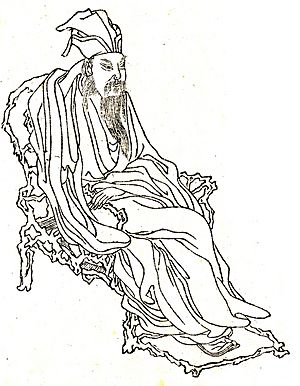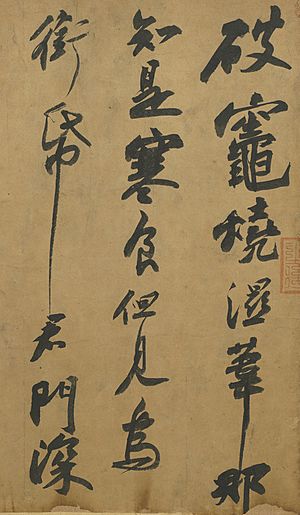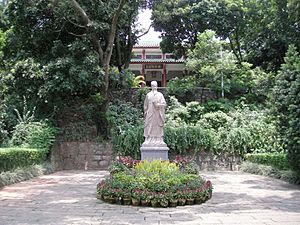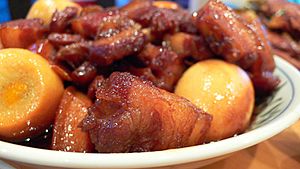Su Shi facts for kids
Quick facts for kids
Su Shi
|
|||||||||||||||||||||||||||||||||||||
|---|---|---|---|---|---|---|---|---|---|---|---|---|---|---|---|---|---|---|---|---|---|---|---|---|---|---|---|---|---|---|---|---|---|---|---|---|---|
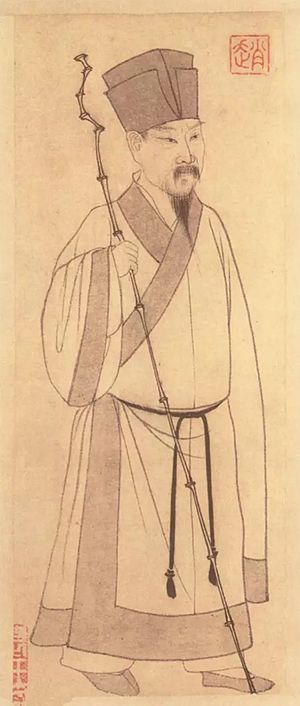
A portrait of Su Shi from the Yuan dynasty by Zhao Mengfu
|
|||||||||||||||||||||||||||||||||||||
| Born | 8 January 1037 Meishan, Sichuan, Northern Song Dynasty
|
||||||||||||||||||||||||||||||||||||
| Died | 24 August 1101 (aged 64) Changzhou
|
||||||||||||||||||||||||||||||||||||
| Occupation | Calligrapher, essayist, gastronomer, pharmacologist, poet, politician, travel writer | ||||||||||||||||||||||||||||||||||||
|
Notable work
|
Former and Latter Odes on the Red Cliffs (前赤壁賦) The Cold Food Observance (寒食帖) |
||||||||||||||||||||||||||||||||||||
| Parent(s) | Su Xun (father) | ||||||||||||||||||||||||||||||||||||
| Relatives | Su Zhe (brother) | ||||||||||||||||||||||||||||||||||||
| Chinese name | |||||||||||||||||||||||||||||||||||||
| Traditional Chinese | 蘇軾 | ||||||||||||||||||||||||||||||||||||
| Simplified Chinese | 苏轼 | ||||||||||||||||||||||||||||||||||||
|
|||||||||||||||||||||||||||||||||||||
| Zizhan | |||||||||||||||||||||||||||||||||||||
| Chinese | 子瞻 | ||||||||||||||||||||||||||||||||||||
| Literal meaning | Little Forward-Looking One | ||||||||||||||||||||||||||||||||||||
|
|||||||||||||||||||||||||||||||||||||
| Dongpo Jushi | |||||||||||||||||||||||||||||||||||||
| Traditional Chinese | 東坡居士 | ||||||||||||||||||||||||||||||||||||
| Simplified Chinese | 东坡居士 | ||||||||||||||||||||||||||||||||||||
| Literal meaning | East Slope Householder | ||||||||||||||||||||||||||||||||||||
|
|||||||||||||||||||||||||||||||||||||
| Su Dongpo | |||||||||||||||||||||||||||||||||||||
| Traditional Chinese | 蘇東坡 | ||||||||||||||||||||||||||||||||||||
| Simplified Chinese | 苏东坡 | ||||||||||||||||||||||||||||||||||||
|
|||||||||||||||||||||||||||||||||||||
Su Shi (Chinese: 蘇軾; born January 8, 1037 – died August 24, 1101) was a very important person in Chinese history. He was known by his courtesy name Zizhan (Chinese: 子瞻) and his art name Dongpo (Chinese: 東坡). During the Song Dynasty, he was a talented calligrapher, essayist, cook, pharmacologist, poet, politician, and travel writer.
Su Shi was a major figure during the Song era. He sometimes held high-level government jobs. He was also important in Song Dynasty politics. He often sided with people like Sima Guang against the New Policy group led by Wang Anshi. Because of his actions, he gained popular support. However, he also faced political challenges that sometimes affected his government career.
Many people consider Su Shi one of the most skilled writers in classical Chinese literature. He created some of the most famous poems, songs, and essays. He was especially famous for his essays. His writings help us understand things like 11th-century Chinese travel literature and details about the iron industry of his time. His poetry has been popular and influential in China, Japan, and other nearby areas for a long time. It is also well-known in English-speaking countries thanks to translations by people like Arthur Waley. Su Shi is sometimes called "the most important person of the eleventh century" in the arts. He also wrote about cooking, and he had a big influence on Chinese food. A famous dish called Dongpo pork is named after him.
Who Was Su Shi?
Su Shi was born in Meishan, which is now in the Sichuan province, near Mount Emei. His brother Su Zhe and his father Su Xun were both famous scholars and government officials. His given name, Shi (軾), means the crossbar railing at the front of a chariot. His father, Su Xun, thought this railing was a humble but very important part of a carriage.
Early Life and Education
Su Shi first went to school with a Daoist priest in his village. Later, his educated mother taught him. Su Shi got married when he was 17. He and his younger brother Su Zhe were very close. In 1057, when Su Shi was 19, both brothers passed the highest-level civil service examinations. This exam, called the jinshi, was required to get a high government job.
His success at such a young age caught the eye of Emperor Renzong. It also impressed Ouyang Xiu, who became Su Shi's supporter. Ouyang Xiu already admired Su Shi's father, Su Xun, and liked his writing style. During the 1057 jinshi exams, Ouyang Xiu suddenly required candidates to write in an old prose style when answering questions about Confucian classics. The Su brothers earned high honors for their excellent answers. They became famous, especially Su Shi, who did exceptionally well in another exam in 1061.
Su Shi's Government Career
Starting in 1060 and for the next twenty years, Su Shi worked in many government jobs across China. One notable place was Hangzhou, where he helped build a walking path across the West Lake. This path is still there and is named after him: sudi (苏堤, Su Causeway). He also served as a judge in Mi Prefecture, which is in modern-day Zhucheng County. Later, as governor of Xuzhou, he wrote a letter to the emperor in 1078. In it, he complained about economic problems and the risk of rebellion in Liguo Industrial Prefecture. This area was important for China's iron industry.
Su Shi often disagreed with the political group led by Wang Anshi. Su Shi once wrote a poem criticizing Wang Anshi's new rules. He especially disliked the government's control over the salt industry. Because Wang Anshi's group was powerful in the government, they were able to have Su Shi sent away for political reasons. They claimed Su Shi was criticizing the emperor, but his poems were actually about Wang's new rules. It's important to know that Wang Anshi himself was not involved in this action against Su Shi. Wang had retired in 1076 and had a friendly relationship with Su Shi.
Exile and Return
Su Shi's first time being sent away (from 1080 to 1086) was to Huangzhou, Hubei. This job had a title but no pay, leaving Su Shi poor. During this time, he started practicing Buddhist meditation. With help from a friend, Su Shi built a small home in 1081. He lived on a farm called Dongpo ('Eastern Slope'), which is where he got his pen name. While he was sent away to Hubei province, he grew to love the area. Many of his best poems were written during this period. His most famous piece of calligraphy, Han Shi Tie, was also created there.
In 1086, Su Shi and other officials who had been sent away were called back to the capital. This happened because a new government came into power. However, Su Shi was sent away a second time (from 1094 to 1100) to Huizhou (now in Guangdong province) and Danzhou, Hainan. In 1098, the Dongpo Academy in Hainan was built where he had lived during his exile.
Even though political arguments often divided government officials, there were times when they cooperated. For example, the famous scientist Shen Kuo (1031–1095) was a close friend and political ally of Wang Anshi. Yet, Shen Kuo became friends with Su Shi. Su Shi knew that Shen Kuo, as a regional inspector, had shown Su Shi's poetry to the court between 1073 and 1075. Shen Kuo was concerned that the poems showed hateful feelings against the Song court. These were the poems that others later used to start a legal case against Su Shi.
After a long time away, Su Shi received a pardon in 1100 and was assigned to Chengdu. However, he died in Changzhou, Jiangsu, in 1101, while traveling to his new job. Su Shi was 64 years old. After his death, he became even more popular. People wanted to collect his calligraphy, paintings of him, and stone carvings marking his visits to places. Shrines were also built to honor him. He was also shown in later artwork, like Li Song's (1190–1225) painting of Su Shi in a boat, called Su Dongpo at Red Cliff. This painting was inspired by Su Shi's poem about a 3rd-century Chinese battle.
Su Shi's Family Life
Su Shi had three wives. His first wife was Wang Fu (王弗, 1039–1065). She was a smart, quiet lady from Sichuan who married him at 16. She died 13 years later in 1065, after having a son named Su Mai (蘇邁). Su Shi was heartbroken and wrote a special message for her. He said Wang Fu was a good wife who often gave him advice about his friends when he was an official.
Ten years after Wang Fu's death, Su Shi wrote a poem (called a cí) after dreaming of her. This poem, "To the tune of 'Of Jinling'" (江城子), is still one of his most famous.
In 1068, two years after Wang Fu died, Su Shi married Wang Runzhi (王閏之, 1048–93). She was his first wife's cousin and 11 years younger than him. Wang Runzhi stayed with Su Shi for 15 years, through his ups and downs in government and during his political exile. Su Shi praised Runzhi for being an understanding wife who treated his three sons equally. His oldest son, Su Mai, was from Wang Fu. Once, Su Shi was upset with his young son for not understanding his sadness during exile. Wang Runzhi gently told Su Shi he was being silly, which made Su Shi write a poem called "Young Son" (小兒).
Wang Runzhi died in 1093, at 46, after having two sons: Su Dai (苏迨/蘇迨) and Su Guo (苏过/蘇過). Su Shi was very sad and wished to be buried with her. On his second wife's second birthday after her death, Su Shi wrote another cí poem, "To the tune of 'Butterflies going after Flowers'" (蝶戀花), for her.
Su Shi's third wife, Wang Zhaoyun (王朝雲, 1062–1095), was his personal helper. She used to be a singer in Qiantang. Wang was only about ten years old when she started working for him. She taught herself to read, as she had not known how before. Wang Zhaoyun was probably the most famous of Su Shi's companions. Su Shi's friend Qin Guan wrote a poem praising her beauty and lovely voice. Su Shi himself wrote many poems for Zhaoyun. Zhaoyun stayed a loyal companion to Su Shi after Runzhi's death. However, she died from illness on August 13, 1095, in Huizhou. Zhaoyun had a son with Su Shi, Su Dun (蘇遁), born on November 15, 1083, but he died as a baby. After Zhaoyun's death, Su Shi never married again.
As a government official, Su Shi was often separated from his family because of his work assignments. In 1078, he was working as a governor in Suzhou. His beloved younger brother was able to visit him for the Mid-Autumn Festival. This visit inspired Su Shi to write the poem "Mid-Autumn Moon," which talks about how precious time with family is. It was written to be sung to the tune of "Yang Pass."
- As evening clouds withdraw a clear cool air floods in
- the jade wheel passes silently across the Silver River
- this life this night has rarely been kind
- where will we see this moon next year
- (translation by Red Pine)
Su Shi had three sons who lived to be adults: Su Mai (蘇邁), who also became a government official by 1084; Su Dai (蘇迨); and Su Guo (蘇過). When Su Shi died in 1101, his younger brother Su Zhe (蘇轍) buried him next to his second wife, Wang Runzhi, as Su Shi had wished.
Su Shi's Amazing Works
Poetry and Writing
About 2,700 of Su Shi's poems and 800 of his letters have survived. Su Shi was excellent at different types of poetry, including shi, ci, and fu. He was also skilled in prose, calligraphy, and painting. Some of his famous works include the First and Second Chibifu (赤壁賦 The Red Cliffs), written during his first exile. Other notable poems are Nian Nu Jiao: Chibi Huai Gu (念奴嬌·赤壁懷古 Remembering Chibi) and Shui diao ge tou (水調歌頭 Remembering Su Zhe on the Mid-Autumn Festival). The first two poems were inspired by the Battle of Chibi, a naval battle from the Three Kingdoms era in 208 AD.
Most of his poems are in the shi style, but he is most famous for his 350 ci style poems. Su Shi also started a style called the haofang school, which focused on a heroic and free spirit. In both his writing and art, he showed a mix of naturalness, clear thinking, and lively descriptions of nature. Su Shi also wrote essays, many of which were about politics and government, such as his Liuhoulun (留侯論). His popular political poems often made Wang Anshi's supporters angry, leading to the Crow Terrace Poetry Trial in 1079. He also wrote poems about Buddhist ideas.
Travel Writings
Su Shi also wrote about his travel experiences in short 'daytrip essays'. These were part of a popular type of writing in the Song era called 'travel record literature' (youji wenxue). These writings used narrative, diary, and prose styles. While other Chinese travel writings had lots of cultural, geographical, and topographical information, Su Shi's daytrip essays mainly used a place or event to share a philosophical or moral idea. He often used persuasive writing. For example, in his essay Record of Stone Bell Mountain, Su Shi explores whether old texts about 'stone bells' were true.
Su Shi and Food
Su Shi is known as one of the four most important classical cooks in China. The other three are Ni Zan, Xu Wei, and Yuan Mei. There's a story, though no real proof, that he accidentally invented Dongpo pork, a very famous dish today. In their book Chinese Gastronomy, Lin Hsiang Ju and Lin Tsuifeng give a recipe for "The Fragrance of Pork: Tungpo Pork." They say that the "square of fat is named after Su Dongpo, the poet, for unknown reasons. Perhaps it is just because he would have liked it."
One story says that Su Shi was making stewed pork. Then, an old friend visited him and challenged him to a game of Chinese chess. Su Shi completely forgot about the stew. Meanwhile, the stew cooked down and became very thick, until its wonderful smell reminded him of it. Some other stories say that villagers simply named the pork dish after him to honor him after his death, but there's no clear proof for any of these stories.
Su Shi explained why he preferred to eat vegetables. He said he never felt comfortable killing animals for his dinner. However, he did crave certain foods, like clams, so he couldn't always stop himself. When he was put in prison, his views changed. He said: "Since my imprisonment I have not killed a single thing... having experienced such worry and danger myself, when I felt just like a fowl waiting in the kitchen, I can no longer bear to cause any living creature to suffer immeasurable fright and pain simply to please my palate."
Images for kids
-
An illustration of a blast furnace smelting cast iron, with bellows operated by a waterwheel and mechanical device, from the Nong Shu, by Wang Zhen, 1313 CE
Error: no page names specified (help). In Spanish: Su Shi para niños
In Spanish: Su Shi para niños
 | Jackie Robinson |
 | Jack Johnson |
 | Althea Gibson |
 | Arthur Ashe |
 | Muhammad Ali |


